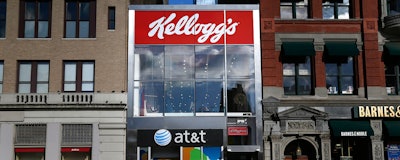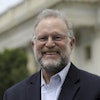
BATTLE CREEK, Mich. (AP) — Rising costs and shifting tastes continue to create hurdles for Kellogg, which posted a 36.5% profit decline in the first quarter.
The company said Thursday that it was replacing its chief financial officer Fareed Khan on July 1.
Kellogg shares fell 3 percent.
Cereal sales in North America slid 4% when currency fluctuations are removed. Companies like Kellogg face increased competition and many consumers, particularly in North America, have shifted their breakfast habits.
Kellogg is trying to follow those trends by pursuing healthier cereals and swapping out brands that don't fit in the mix any more, while adding those it believes will deliver growth.
The company announced the sale of Keebler cookies last month. In 2017, it acquired the protein bar maker RXBar.
At about the same time it named Steven Cahillane, who led vitamin seller Nature's Bounty Co., as its CEO.
On Thursday, Cahillane said the company remains "squarely on strategy and on plan."
"We also restructured our organization for greater agility, and further reshaped our future portfolio by reaching an agreement to sell certain brands later this summer," Cahillane said. "Meantime, we overcame some unexpected headwinds in our North America business in Q1, and delivered earnings that keep us on track for the year's financial targets."
The company did lower its 2019 outlook due to the sale of some brands, including Keebler. Net sales growth is expected to be around 2%, down from the previous growth of 2% to 4% that the company had expected.
David Driscoll, an analyst with Citi, said organic revenue trends should lead to improvements in the current quarter.
"Kellogg indicated that it remains on track to hit its 2019 goals (guidance was adjusted for the Keebler divestiture) and continues to forecast full year organic sales growth of 1% to 2%, which implies good acceleration over the coming quarters," Driscoll wrote Thursday.
Kellogg reported a 2 percent sales decline in North America for the January-March period. The maker of Frosted Flakes, Pop Tarts and Eggo waffles said Frozen food sales also fell 1.5 percent, while sales of snacks such as Pringles were flat.
A January recall of RXBar also hurt sales. The company — which was acquired by Kellogg in 2017 — recalled 15 varieties of protein bars because of undeclared peanuts.
Net sales also fell in Europe and Latin America, but that was partly due to currency translation. Sales were up significantly in the company's Asia, Middle East and Africa division.
Kellogg Co., based in Battle Creek, Michigan, earned $282 million in the first quarter, or 82 cents per share.
Earnings, adjusted for Brexit impacts, income taxes and other non-recurring charges, came to $1.01 per share. That topped Wall Street's expectations. The average estimate of seven analysts surveyed by Zacks Investment Research was for earnings of 95 cents per share.
Kellogg posted revenue of $3.52 billion, which met forecasts.
Fareed Khan, who has been CFO since 2017, will be replaced by Amit Banati, who is president of Kellogg's Asia, Middle East and Africa division.




















